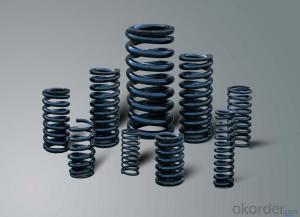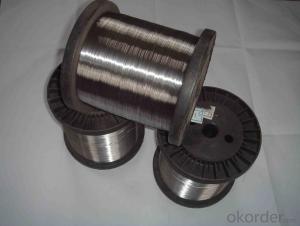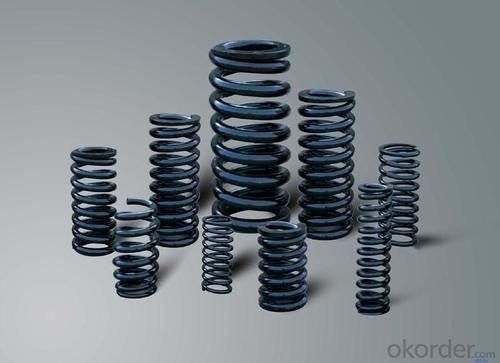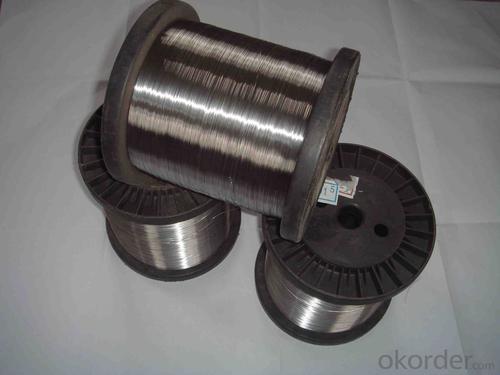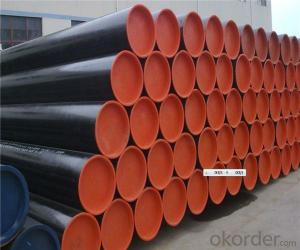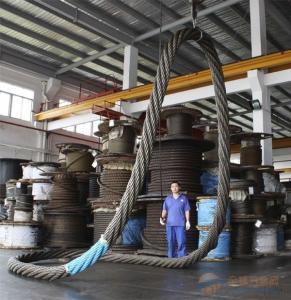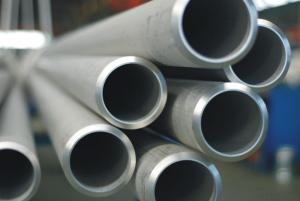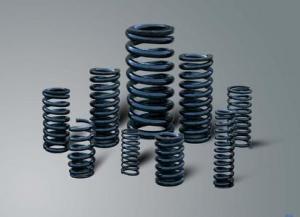Stainless Steel Spring Wire Hot Sale and High Quality
- Loading Port:
- Shanghai
- Payment Terms:
- TT OR LC
- Min Order Qty:
- 500 kg
- Supply Capability:
- 10000 kg/month
OKorder Service Pledge
OKorder Financial Service
You Might Also Like
1.Packing And Delivery
Package: Seaworthy package
MOQ: 0.5 tons
Delivery: 15-20 days
Monthly Output: 100 tons
Payment : 30%T/T in advanced+70% balanced;irrevocable L/C at sight
Remarks: All-risk insurance and accept the third party test
Port : Shanghai
AISI 316 high tensile strength stainless steel spring wire
| Detail as follows: | |
| Standard | AISI,ASTM,GB,SUS etc |
| Grade | 201,202,204,301,303,304,304L,310,316,316L etc |
| Diameter | 0.7mm-14.0mm |
| Surface | Bright or matt |
| Condition | hard |
| Tolerance | +/-0.03mm |
| Length | According to customers’ requirement |
| Packing | Packed by weaved bag or according to customer's requirements |
| Technology | Cold drawn |
| Application | Spring |
| Productivity | 300 tons/month |
| MOQ | 100KG |
| Note | We can produce other standard as the customers' requirement |
1. Competitive price and quality from our own factory
2. Approved by ISO9001, CE, SGS every year
3. Best service with 24 hour`s reply
4. Flexible payment with T/T,L/C , paypal, kunlun bank, western union, etc.
5. Smooth production ability(50000tons/month)
6. Quick delivery and standard exporting package
7. OEM/ODM
- Q: How are steel pipes used in the construction of gas distribution networks?
- Steel pipes are commonly used in the construction of gas distribution networks due to their strength, durability, and ability to withstand high pressure. These pipes are used to transport natural gas from the source to homes, businesses, and industries safely and efficiently. They are often buried underground and connected through a network of pipes, allowing for the distribution of gas to various locations. The corrosion-resistant nature of steel ensures the longevity of the pipes, making them a reliable choice for gas distribution infrastructure.
- Q: How do you transport steel pipes safely?
- In order to transport steel pipes safely, it is essential to engage in proper planning, utilize appropriate equipment, and adhere to safety measures. To ensure the safe transportation of steel pipes, the following guidelines should be followed: 1. Select suitable transportation equipment: Opt for either a flatbed trailer or a truck with a flatbed when transporting steel pipes. Make certain that the trailer or truck is equipped with a robust and secure tie-down system to prevent any movement or shifting of the pipes during transit. 2. Secure the pipes: Use either nylon or steel straps to fasten the steel pipes to the trailer or truck bed. Ensure that the straps are adequately tightened so as to evenly distribute the weight of the pipes and prevent any potential movement or shifting. 3. Safeguard the pipes: Implement the use of pipe chocks or protective materials such as foam or rubber to prevent the steel pipes from rolling or rubbing against each other during transportation. This will aid in minimizing any possible damage and maintaining the integrity of the pipes. 4. Adhere to weight restrictions: Verify that the weight of the steel pipes being transported does not exceed the load capacity of the transportation equipment. Overloading can lead to instability and compromise safety. 5. Comply with road safety regulations: Abide by all local traffic laws and regulations, including adhering to speed limits and securing any necessary permits or licenses for oversized loads if required. Additionally, utilize hazard warning signs or flags when transporting lengthy or oversized steel pipes to alert other road users. 6. Perform regular inspections: Prior to embarking on the journey, inspect the straps, tie-downs, and other securing mechanisms to ensure they are in satisfactory condition. Regularly monitor the load during transit to guarantee its continuous security. 7. Plan the route: Select a route that is suitable for the size and weight of the steel pipes being transported. Avoid roads with low bridges, narrow lanes, or weight restrictions that may pose a hazard to the safe transportation of the pipes. 8. Consider weather conditions: Take into account weather conditions, such as strong winds or heavy rain, which can impact the stability of the load. Make necessary adjustments to the transport plan or postpone the journey if deemed necessary. 9. Train and educate drivers: Ensure that the drivers responsible for transporting steel pipes are adequately trained and knowledgeable about the proper procedures for securely and safely transporting the load. Regularly provide them with updates on safety protocols and any changes in regulations. By adhering to these guidelines, the transportation of steel pipes can be executed safely, thereby reducing the risk of accidents, damage to the pipes, and ensuring the safety of all individuals involved in the transportation process.
- Q: Can steel pipes be used for conveying sewage and wastewater?
- Yes, steel pipes can be used for conveying sewage and wastewater. Steel pipes are known for their strength, durability, and resistance to corrosion, making them suitable for transporting various types of fluids, including sewage and wastewater. Additionally, steel pipes can withstand high pressure and are capable of handling the abrasive and corrosive nature of sewage and wastewater, making them a reliable choice for such applications.
- Q: What is the average lifespan of steel pipes?
- The average lifespan of steel pipes varies depending on various factors such as their quality, usage, and maintenance. However, under normal conditions, well-maintained steel pipes can last for several decades or even longer.
- Q: How are steel pipes used in the manufacturing of marine applications?
- Steel pipes are commonly used in the manufacturing of marine applications due to their durability and resistance to corrosion. They are used for various purposes such as constructing ship hulls, offshore platforms, and underwater pipelines. These pipes provide structural support and can withstand the harsh conditions of the marine environment, making them essential components in the manufacturing process of marine applications.
- Q: What is the cost of steel pipes compared to other materials?
- The cost of steel pipes can vary depending on various factors such as size, grade, and market conditions. However, generally speaking, steel pipes tend to be more cost-effective compared to other materials like copper or PVC. Steel is a durable and versatile material that offers exceptional strength and longevity, making it a popular choice for various applications.
- Q: What is the difference between hot-dipped galvanized and electro-galvanized steel pipes?
- Hot-dipped galvanized and electro-galvanized steel pipes are both types of steel pipes that have undergone a galvanization process to protect them from corrosion. However, there are some key differences between the two processes. Hot-dipped galvanized steel pipes are immersed in a molten zinc bath, which results in a thick coating of zinc being applied to the surface of the steel. This process creates a durable and long-lasting corrosion-resistant barrier. The thickness of the zinc coating can vary, but it is generally thicker than that of electro-galvanized steel pipes. On the other hand, electro-galvanized steel pipes are coated with a thin layer of zinc using an electroplating process. This process involves passing an electric current through the steel pipes while they are immersed in a zinc solution. The zinc particles are then deposited onto the surface of the steel, creating a thin and uniform protective barrier. One of the main differences between these two processes is the thickness of the zinc coating. Hot-dipped galvanized steel pipes have a thicker and more robust coating, making them more suitable for applications in harsh environments or where the pipes will be exposed to corrosive substances. Another difference is the appearance of the pipes. Hot-dipped galvanized steel pipes typically have a dull grayish finish, while electro-galvanized steel pipes have a smoother and more polished appearance. In terms of cost, electro-galvanized steel pipes are generally more economical compared to hot-dipped galvanized steel pipes. This is because the electroplating process is less labor-intensive and requires less zinc. Overall, the choice between hot-dipped galvanized and electro-galvanized steel pipes depends on the specific application and the level of corrosion resistance required. Hot-dipped galvanized steel pipes are typically used in more demanding environments, while electro-galvanized steel pipes are suitable for less corrosive applications where cost-efficiency is a priority.
- Q: How do you calculate the weight of steel pipes?
- To calculate the weight of steel pipes, you can use the formula: weight = volume × density. The volume of a steel pipe can be calculated by multiplying its cross-sectional area (πr²) with its length. The density of steel is typically known, or you can refer to a density table. By plugging in these values, you can determine the weight of steel pipes.
- Q: Can steel pipes be used for heat transfer applications?
- Yes, steel pipes can be used for heat transfer applications. Steel is a good conductor of heat, which makes it an excellent choice for transferring thermal energy from one place to another. Steel pipes are commonly used in various heat transfer systems such as heating, ventilation, and air conditioning (HVAC) systems, industrial process heating, and steam distribution networks. The high thermal conductivity of steel allows for efficient heat transfer, ensuring that heat is effectively transported and distributed throughout the system. Additionally, steel pipes have good strength and durability, making them suitable for withstanding high temperatures and pressures often encountered in heat transfer applications. Overall, steel pipes are a reliable and widely used solution for heat transfer purposes.
Send your message to us
Stainless Steel Spring Wire Hot Sale and High Quality
- Loading Port:
- Shanghai
- Payment Terms:
- TT OR LC
- Min Order Qty:
- 500 kg
- Supply Capability:
- 10000 kg/month
OKorder Service Pledge
OKorder Financial Service
Similar products
Hot products
Hot Searches
Related keywords
